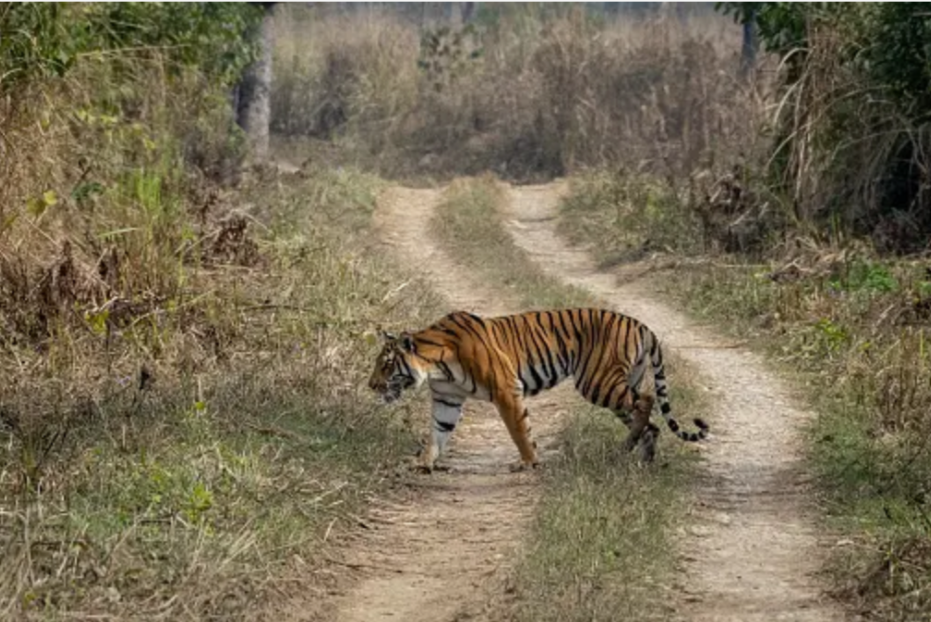Trip Info
Overview
Chitwan National Park is the 1st national park of Nepal which covers an area of 952.63 km2 and is situated in the south-central region, in the subtropical inner Terai low lands of Nawalpur, Parasi, Chitwan, and Makwanpur districts. Chitwan National Park (CNP) was established in 1973 and was recognized as a world heritage site in 1984. The altitude of CNP ranges from 100m to 815m i.e. From river valley to Churia hills. To the east of Chitwan National Park lies Parsa National Park, contiguous in the south is the Indian Tiger Reserve Valimiki National Park. CNP is one of the richest National Park in terms of wildlife and green vegetation. The park was also a royal hunting reserve until 1951. Besides the amazing wildlife, CNP also holds a religious value among people especially Hindus. There are two religious sites in the extreme southwest corner named Bikram Baba at Kasara and Valmiki Ashram at Tribeni. Many Hindus from Nepal and India visit the holy place yearly. Basically, Chitwan is the most explored tourist destination after Kathmandu and Pokhara. CNP was able to attract more than 142,000 foreign tourists the year before the COVID breakout. CNP has also provided a great opportunity for employment to Nepalese. According to the head of the Chitwan Nature guide association, there are about 500 professional guides employed there.
Climate– Situated in the inner Terai low lands, Chitwan has a tropical monsoon climate with high humidity throughout the year. Monsoon starts from mid-June and ends in late September, this time of the year receives heavy rainfall and mostly causes a dramatic huge flood. These floods are responsible for the alternation of courses and character of rivers in Chitwan. The maximum temperature during this season is 38⁰C while the lowest can be 6⁰C. The winter season which includes the end of October to February has the coolest weather. January is the coolest month and the temperature almost reaches to freezing point especially when it rains. The daytime temperature of the winter season is around 20-25⁰C.
Vegetation– About 70% of the CNP is covered with Himalayan subtropical broadleaf forest predominantly with Sal. 20% is covered with Terai-Duar Savanna and grasslands. More than 50 species of rare floras are found here. Some of them being the world’s tallest grasses includes Saccharum ravennae, giant cane, khagra reed, etc.
Fauna– 68 species of mammals are found here which includes Bengal tigers, Indian leopards, sloth bears, striped hyenas, golden jackals etc. In 2006, 543 species of birds were recorded in CNP which is much more than in any other protected area of Nepal. This includes white-throated kingfisher, paradise flycatcher, Gould’s sunbird, etc. More than 17 species of snakes, starred tortoise, and monitor lizards including king cobra and rock python are found here.
Things to do in CNP
Jeep Safari– Jeep safari is one the best way to explore the jungle and witness many animals and plants. During this safari, you will be sitting on the back of the open jeep and the driver will be showing you different spots and animals. There is also a guide provided who will guide you with directions, give information about the plants and animals, and try to spot as many animals as they can. There are basically two options available for a jeep safari. One is a half-day tour which is 4 hours long. You will be sitting with 7 other people in a jeep and exploring the jungle. And the other option is a full-day tour that is 10 hours long. Here, you will have more comfortable cars and seats. In this full-day tour, you will go more deeply into the jungle and probably witness tigers. When you are in a jeep safari tour, you are not allowed to leave the jeep and walk around. Also, you need to show your national park permit in different places so it is best to keep it safe. A half-day jeep safari tour costs 180$+ National Park permit. And a full day jeep safari tour costs 240$+National Park permit.
It is recommended not to wear bright clothes as they scare the animals. Any dark grey, black, grey dresses are suitable.
Elephant Safari– Elephant safari is another best way to explore the jungle and witness many wild animals and plants. It is, however, more adventurous than Jeep safari and also provides a close-up view of animals. During this safari, you will be seated on the back of a highly trained elephant with a few other people. The tour is around 1-1.5 hours long where you will be exploring the jungle. Elephant safari costs around 1500-2500 NRS. During this tour, you need to be very silent and doesn’t make unnecessary sounds as it will scare the wild animals. Also, you will be very close to trees and plants so, a full sleeve cloth is recommended so that you won’t get scratches.
Canoe ride– A Canoe ride is one of the finest options for relaxing and enjoying the tour. This is done in the gorgeous Rapti River with a traditional hand-rowed canoe. During this canoe ride, you will get to see the beautiful view of CNP and many birds along with the crocodile in the Rapti River itself. A short canoe ride is almost 45 minutes long and costs you around 2,000 NRS. A long canoe ride is around 2 hours long up to the crocodile breeding center and costs you around 6,000 NRS.
Jungle walk– Jungle walk is one of the adventurous and thrilling activities to do in CNP. During this walk, you can pass through dense forests around the natural habitats of wild animals. However, you need at least one other trekker and a licensed guide. Weapons or any kind of harmful stuff are not allowed to carry during the walk. Guides take the tourist for a 5 to 10km walk where trekkers can encounter many elephants, rhinos, birds, and deer. It is also not allowed to make unnecessary noises during the jungle walk.
Tharu cultural program– It is said that Tharus are indigenous people of Sauraha. This is a cultural dance performed by Tharu’s reflecting their tradition and lifestyle. They wear colorful Tharu dresses and dance in unique Tharu songs and music. This is one of the main highlights of the Chitwan tour which entertains the visitors with their amazing dance. There are several types of dances there like Danda Nach (stick dance), Ago Nach (fire dance), Mayur Nach (peacock dance), etc. the program lasts for 45 minutes and costs 150-200 NRS.
Bird watching tour– Bird watching is one of the main attractions of Sauraha. As the park is home to hundreds of species of birds, tourists enjoy bird watching. There is a separate zone for bird watching inside the park. It is better to take a guide with you since they will provide additional information about the birds. This is almost a 3-4 hours tour and costs you 8,000 NRS + National Park permit.
Getting to Chitwan National Park
It is really easy and fast to reach Chitwan National park from Kathmandu. There is a public bus available from Kathmandu which takes around 4 hours and costs 300-400 NRS. There is also a minibus which is more comfortable than buses. It cost you around 450-500. Again, there is a tourist bus available from Kathmandu which takes around 3.5 hours to reach Chitwan and costs you around 600 NRS. The easiest and fastest option is to take a flight from Kathmandu to Chitwan which only takes 20 minutes and costs you 3000-35000 NRS. From Chitwan city, any public bus or jeep is available to Sauraha which is the entry point of CNP.
Highlights
- Witness much rare flora and fauna which includes Bengal tigers, Indian leopard, etc
- Experience many activities like canoe rides, and bird watching.
- Get close-up views of animals and plants during elephant safari
- Lifestyle and hospitality of Tharu people including their amazing cultural dance program

